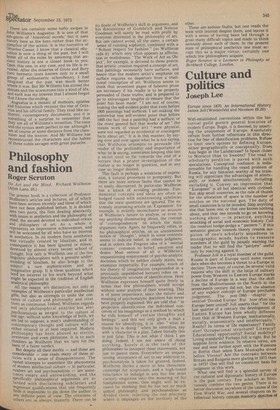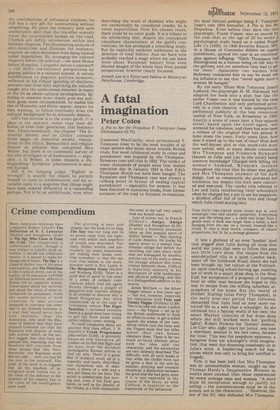Culture and politics
Joseph Lee
Europe since 1870. An International History James Joll (Weidenfeld and Nicolson £6.20) Well-established conventions within the historical guild govern general histories of modern Europe. Begin, it is decreed, by asserting the uniqueness of Europe. Resolutely refrain from further reflections in this direction for fear of identification problems. Refuse to limit one's options by defining Europe, either geographically or conceptually. Does Asia begin at the Landstrasse? Is Spain closer to Morocco than to Sweden? The road to scholoarly perdition is paved with such speculations. Conceptual confusion is indispensable for handling the vexed problem of Russia, for any historian worthy of his training will appreciate the advantages of altern-. ately, or indeed simultaneously, including excluding it. Convey an impression that " European" is all but identical with civilised. But skip small countries, as the rule of thumb for the allocation of space is the number of notches on the national gun. The duty of small countries is to be invaded. Skip anything else that bores one, or that one knows nothing about, and that one intends to go on knowing nothing about — in practice, anything smacking of social and economic history. Call the residual hodge-podge a "pattern ". It' this semantic gesture towards theory creates suspicion of one's scholarly soundness in monographic minds, hasten to reassure members of the guild by piously warning the reader that he will find the "pattern" useful only by reacting against it.
Professor Joll is a loyal member of the guild. Russia is part of Europe until some recent date when she becomes a threat to a Europe in decline. There may, of course, be several valid reasons why the shift in the locus of military power from Western to Eastern Europe marks a decline of Europe in a way that the shift from the Mediterranean to the North in the seventeenth century did not, but the absence of any explicit concept of Europe precludes judgement. The post-1945 chapter is entitled 'Divided Europe. But how often nas Europe been united? Jolt asserts that "for the last quarter of a century the development of Eastern Europe has been wholly different from that of Western Europe, institutionally, socially, economically and intellectually." Really? In terms of life expectancy? Family size? Occupational structure? Literacy? Educational opportunity? Social mobility? Living standards? Perhaps Joll is right. But he supplies little evidence. In relative terms, are east and west farther apart with the Russians in Berlin than when Kara Mustapha stood before Vienna? Are the contrasts between Britain and Bulgaria more glaring in 1973 than in 1873? One will find no consistent basis for judgment in this work. What one will find is a splendid survey of the cultural and diplomatic history of Europe in the past century. Few scholars so felici tuously combine the two genres. There is no better discussion anywhere of the causes of the First World War, and several chapters on intellectual history contain masterly sketches of
the contributions of influential thinkers, for JoII has a rare gift for summarising without simplifying. He plots the itinerary with such unobtrusive skill that the traveller scarcely notes the unavoidable bumps on the road. Themes are deftly interwoven within and between chapters. The illuminating analysis of anti-Semitism and Zionism for instance, acquires an extra dimension from being treated under imperialism. By arranging the cultural chapters before the political —we meet Mosca before Mussolini, Langbehn before Ludendorff — Jo11 shifts conventional perspectives by placing politics in a cultural context. A certain• indifference to popular politics however, reflected in his virtual ignoring of elections, prevents him from fully exploiting his valuable insight into the ambivalence inherent in many of the fin de siècle cultural developments. By failing to examine more closely post-war political grass roots circumstances, he makes the rise of Mussolini and Hitler appear, despite his own warning, to follow inevitably from the cultural background he so delicately depicts.
Jolt's real interest is in the avant-garde. It is ideas in the abstract, rather than their diffusion, or even their generation, that fascinate him. Characteristically, the chapter 'The Industrial Society and its Critics ' contains three pages on industrial society, twentythree on the critics. Bureaucracy and religion feature as subjects that concerned Max Weber but there is no systematic survey of the rdle of religion or of bureaucracy — arguably, i a Weber, in some respects a distinguishing ' European 'phenomenon in modern Europe.
Joll is no hanging judge. "Rightly or wrongly" is usually the closest he permits himself to come to condemnation, and his invariable reply to a suspicion that things might have been ordered differently is a resounding perhaps. Nor is he an exhibitionist, even when describing the work of thinkers who might not uncharitably be considered cranks, he is never supercilious. Over his chosen route, there could be no surer guide. It is a tribute to his scholarship that, despite the conceptual casualness characteristic of the guild's conventions, he has produced a rewarding study. But he explicitly eschews ambitions in the direction of total history. And we have now probably reached a stage where we can learn more about 'European' history from even blurred images of the whole than from partial perspectives, however clearly focussed.
Joseph Lee is a Tutor and Fellow in History at Peterhouse, Cambridge.

































 Previous page
Previous page